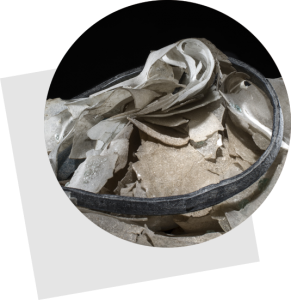Polyvinyl butyral (or PVB) is a resin usually used for applications that require strong binding, optical clarity, adhesion to many surfaces, toughness and flexibility. The major application is laminated safety glass for automobile windshields.

When we tack on the ecological side of things and the forthcoming amount and subsequently very complicated disposal of a number of products, which have in some shape or form passed their utility value for customers, we arrive at a huge mass of products that not being able to fulfil their intended use, do all-the-while contain a treasure of hidden potential, which, upon effective utilisation, represent the base for further utilisation and the production of new, often very valuable products which retain their primary qualities, and are likewise able to transfer their quality to new products for a wide range of applications.
This theme made up the cornerstone in the materialisation of the aims of SKLOPAN LIBEREC co., i.e. to utilise used, abused, and discharged auto windscreens.
Besides film, pressed into automotive and special building glass, it includes a range of paints, putty, sprays, insulation and an admixture for other materials, whose qualities are qualitatively increased, while maintaining economic advantages.
A highly developed and sophisticated system of cleaning and removing admixtures and remains, especially of glass, provide the opportunity of making film, either of that material or combined with other polymers. That opens the doors to a range of other products which arise from such interesting material and used in a whole range of areas. They all the while gain a whole set of unique qualities, such as flexibility, firmness, elasticity and resistance to penetration.
For these individual levels of cleaning individual raw materials which arise during the course of the process, the recycling line for PVB film is incorporated.
The unique technological set that the company of SKLOPAN has developed together with company SAPERATEC, provides for the opportunity to re “mine” the glass and prepare it for a whole range of already mentioned applications.
The first stage of the so-called dry cleaning has been developed by SKLOPAN LIBEREC. The second stage of the so-called wet cleaning has been developed and patented by the German company Saperatec.
The whole recycling process includes several levels of cleaning with a clearly defined quality of the outstanding parts and thereby the intended utility value, which pre-ordains the possibility of effective utilisation.
It is then the task of each customer to therefore choose the degree that serves their needs, the quality which corresponds to their technology and use.
See the photographs for an initial impression of the product.
Among others, it is verified and, along with the producer and processor of this film, it is practically tested for the ability to use the product for its original use. At the current stage, the share of this raw material in its original mixture is about 20%.